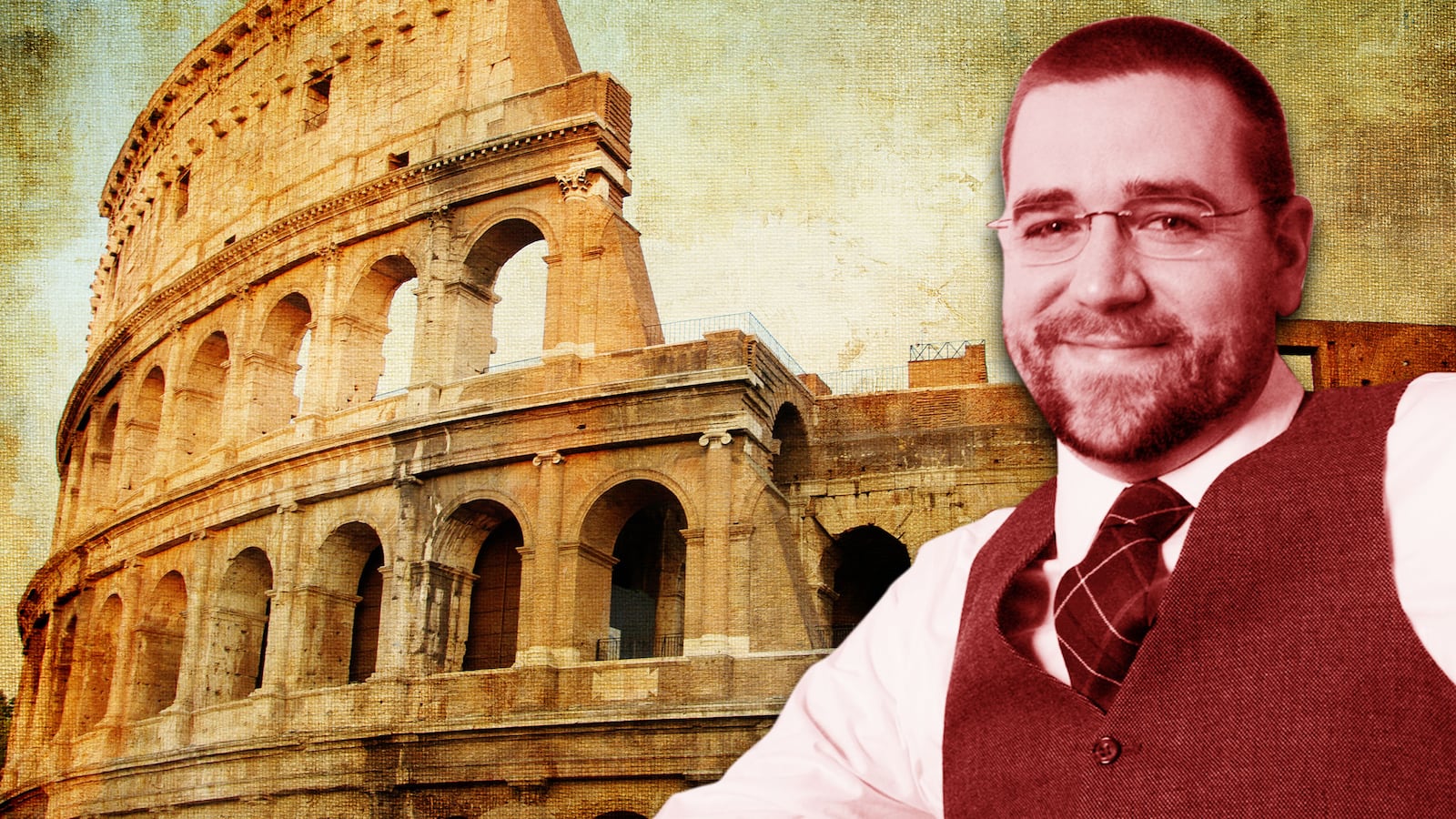Is it true, I ask Mike Duncan, that his 189-part podcast chronicling the history of Ancient Rome has been downloaded 56 million times?
“No, it’s more than that,” Duncan says with the erudite, cool-guy delivery that’s helped make his The History of Rome podcast a stunning success and turned Duncan into a kind of hipster Edward Gibbons. In fact, together with Duncan’s ongoing Revolutions series, which narrates the stories of the English, French, American, and Haitian revolutions, Duncan’s podcasts have been downloaded over 100 million times.
That’s a lot of downloads, and it drew the attention of a literary agent and a publisher who clearly know a platform when they see one.
This brings us to The Storm Before the Storm: The Beginning of the End of the Roman Republic, which debuts this week as number eight on The New York Times nonfiction bestseller list. Duncan’s new book chronicles the violent upheavals in the half-century before the celebrated ancients Caesar, Pompey, and Mark Antony bloodied the Mediterranean soil working out their political and personal beefs.
“People are quite familiar with that period,” Duncan says of Caesar and company. “But if you’re jumping into that story, you’re jumping into the movie in the third act. There was an entire generation or two before Caesar comes along that sets up everything that went wrong in the generation of Julius Caesar.”
The Storm Before the Storm is set between 133 and 80 BC. Rome, having won its war with Carthage, was struggling to manage a vast military empire. On the domestic front, Rome was coping with economic inequality, an influx of immigrants that challenged Roman ideas of citizenship, and a breakdown of political norms that resulted in vicious political disputes and political paralysis.
Sound familiar?
Yet at a moment when it’s commonplace to say that the American empire is well on its way to an inevitable decline, Duncan is reluctant to draw exact parallels between Ancient Rome and America today.
“Despite what some hysterical commentators may claim,” he writes in the book’s introduction, “the (American) Republic has not collapsed and been taken over by a dictator. That hasn’t happened yet.”
The parallels, however, do mount up. And it’s hard not to think of Donald Trump when Duncan writes about “a time when a lie was not a lie if a man had the audacity to keep asserting the lie was true.”
Rome got into trouble, Duncan says, when the elites began to concentrate on short-term political victories. “They were really focused on making sure that their political rivals didn’t get a win,” he says. It was this political gamesmanship—so eerily familiar to Americans today—which, in Duncan’s view, “really led to the long-term destruction of the Empire because they were ignoring real socio-economic problems.”
Roman social woes certainly do sound oddly contemporary.
“There was the massive influx of new wealth,” Duncan says, which was concentrated in the hands of Rome’s wealthiest citizens. “We’re talking about literal wagon trains filled with gold brought back and deposited in Rome and being distributed among these patrician and senatorial elites.”
The new wealth came from the spoils of war. But the men doing the fighting weren’t getting their fair share of the plunder.
“The people who were privates in the army, the lower-class Romans came back from these wars not richer than ever, but poorer than ever,” Duncan says. “So this new wealth created, I wouldn’t say, skyrocketing inequality, but it had a noticeable impact.”
He sees a parallel here with America at the end of the Cold War. Once the Romans had defeated their key military rivals, their leaders began to attack one another rather than their foreign enemies.
“You start to turn your ambition against your domestic political rivals instead of against a foreign enemy,” Duncan says, “and then that leads to collapse of norms of behavior.”
The dramatis personae struggling with these upheavals in Roman society were a lot nastier than the likes of Steve Bannon.
There’s the Gracchi brothers, doomed agrarian reformers; the great general Marius, whose life contains enough hair-raising adventures for a dozen gruesome action movies; and the military and political mastermind Sulla, who used his own army to march on Rome long before Caesar crossed the Rubicon.
“For whatever reason, the popular press or historians in general have neglected this period,” Duncan says. “The Gracchi, Sulla, Marius, these are towering figures. These are life-and-death struggles. There’s civil war. The Republic almost falls. All on its own, this period is fascinating and exciting. And to my astonishment and good luck, nobody had really tackled it before.”
Duncan is something of an entertainer as well as an historian, and he doesn’t skimp on the bloody details as the bodies pile up or are dumped unceremoniously into the Tiber. And if Donald Trump thinks his tweeting and name calling makes him a tough guy, he should consider what Roman pols did to their rivals.
Take the fate of politicos such as the reform-minded Gracchi brothers. Gaius, the younger of the brothers, died after his rival Optimius placed a bounty of gold on Gaius’ head. The amount of gold to be paid, Optimus announced, would be determined by the actual weight of the severed head. Soon Gaius’ enemies cornered him on the outskirts of Rome. Duncan presents the gruesome details, quoting from historical sources:
“Handing a dagger to his slave, Gaius exposed his neck and ordered the slave to plunge the dagger into his throat. The slave obliged… After his body was found, Gaius’ head was duly cut off and secured by a savvy former supporter. The erstwhile Gracchan carried the head home and ‘bored a hole in the neck, and drawing out the brain, poured in molten lead in its place.’ Then he carefully, ‘stuck the head of Gaius on a spear and brought it to Optimus, and when it was placed in a balance it weighed seventeen pounds and two thirds.’ Optimus paid him in full.”
“Wasn’t that great?” Duncan says with a laugh when I mention the fate of Gaius Gracchus. “There is something macabre about it for sure,” he concedes. “It’s probably the same way that watching violent movies has a certain appeal. Roman history is very NC-17.”
It’s no surprise, then, that judging from his fan mail and the book store crowds on his current promotional tour, his audience turns out to be primarily male.
Asked to explain how he managed to turn his podcast into a business, Duncan shrugs. “You got me,” he says.
It all started in 2007 when Duncan Googled “How to do a podcast.” He posted his work on iTunes and did nothing to promote it. After a few years, Audible came on as a sponsor, and what started as a hobby began to turn into Duncan’s career.
“The thing that I had going for me is that when I went looking for a Roman history podcast, none existed. And I was like, ‘Whoa, I think I can actually put something together here.”
The podcasts themselves are anything but flashy.
“It’s me talking fairly sedately into a microphone for 25 to 30 minutes and then doing it again and again and again,” Duncan says. Plus there are always “a few snarky comments” thrown in.
“There’s not a lot of whiz bang. It’s the same thing with the book. The material itself is so compelling that all I’m trying to do is get out of the way of it. I don’t need to be Shakespeare to make this great. I just need to write clear sentences and let the story tell itself.”
Duncan, 37, grew up outside of Seattle and earned a degree in political science from Western Washington University. He left a program in public history at Texas State University to follow his wife, a graphic designer, to Madison, Wisconsin, where he worked as a “fishmonger,” as he puts it, cutting and selling fish for supermarkets. On the weekends, he’d do his podcast. These days, he’s something of a stay-at-home dad, helping to raise the couple’s two children.
“I’m officially a grad school dropout which I shall remain forever,” Duncan says with some pride. He calls himself a “narrative historian” as opposed to an academic historian.
“What I’m doing is using all of that knowledge that professional historians have unearthed, and I’m weaving it together into stories so that people can know what happened. I’m obviously a popularizer of history. I’ve had a lot of success telling people the who, what, when, where, and why of history which, as a genre of history, has really fallen off the map.”
While Duncan maintains that “history’s natural state is a chronological narrative,” he doesn’t ignore deeper matters. So if The Storm Before the Storm is a cautionary tale, what are the major lessons for America today?
Duncan points to the way that Rome’s leaders ignored the anger that was rising up in the society—which, of course, brings to mind the rancor that played a part in the election of our current president.
“There was a lot of basically revolutionary energy that was created, the resentment of the rural peasants, the resentment of the urban poor, the resentment of the non-Roman Italians. All this was growing and growing,” Duncan says. “There’s so much pressure and energy that is being built up.”
And when resentment is left to fester, it’s vulnerable to manipulation by “cynical demagogues who don’t really care about the long-term health of the state,” he says. “They don’t care about improving anybody’s lives. They just want to take that energy and use it to blast their enemies. That’s the demagogic model: use populist resentment against your enemy and then you emerge victorious at the top.”






